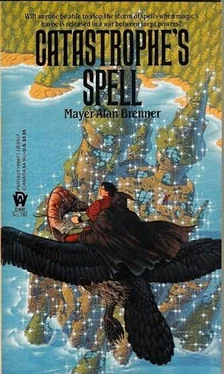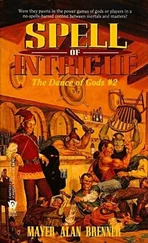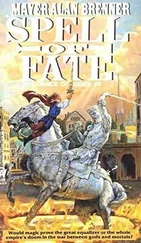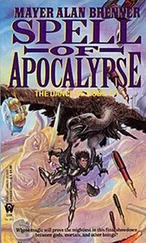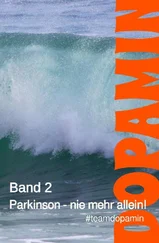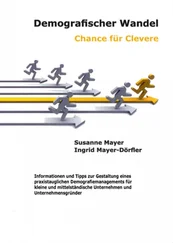As Shaa reentered the street, a small pack of dogs appeared going the other way, back into the alley. “Ah,” Shaa said again, inclining his head pleasantly at them. “My compliments.” The last dog nodded back, and Shaa strolled off into the city.
The old part of Roosing Oolvaya was a cramped place, constrained by the shapes of the city walls and the crabbed windings of the narrow streets. Even in the bazaars and business districts the crowds were sparse. People looked over their shoulders and walked lightly, keeping watch for mercenaries, the militia, and the Guard. Some stores were closed, many with boards thrown up and rudely nailed across doors and shattered windows, while other stores and buildings had been sacked and burned. Smashed merchandise lay trampled on the cobblestones.
Several times Shaa encountered bands of armed men marching freely through the streets. They wore armbands showing an unfamiliar rune that looked, to Shaa, roughly like a flaming purple pretzel. Shaa was not accosted, though some of the troopers eyed him expectantly and fingered their swords. It was still early in the afternoon, the day was pleasant, and tempers were comparatively mild, though, so it appeared that the different forces were not yet spoiling for trouble.
Shaa wandered in a roughly eastward direction with his ears open for news. Finally the street he was on took a sharp zag and unexpectedly opened onto the Boulevard of the Fifth Great Flood. The Boulevard, much wider and with a much more lively atmosphere than the earlier streets, was the center of the waterfront entertainment district. Muggy breezes from the docks and wharves five blocks east rolled in sluggish currents toward the rest of the city. Equally muggy sailors off the river barges were rolled in along with then. Shaa stepped around three mariners snoring in a happy pile at the intersection and ambled down the Boulevard.
Most of the entertainers had removed themselves from the street, although a number leaned from second-story windows, surveying the traffic and making an occasional proposition. Shaa checked them over with a professional eye. He had spent time on the Boulevard. Aside from his long-standing fondness for the Fifth Great Flood, he had once combined a part-time job as Waterfront Health Inspector and Tariff-Collector with a fairly lucrative smuggling racket.
During Shaa’s walk, curfew notices had begun appearing around the city. Shaa, along with most of the population, had no intention of actually staying indoors, but he decided he might as well put his feet up for a bit and see if the world would provide anything interesting for free, or at least with a minimum of investment. Shaa was known to make house calls, and he didn’t see why the world should be less particular. He ran through his memories of the local inns. The Wyvern’s Fodder had been his favorite in Roosing Oolvaya, but it was near the north wall, at least a half-hour’s walk away. Hmm … he had once spent productive time at - what was that place?
As it turned out, the place was the Bilious Gnome, and it was only two blocks north. The inn was embedded in the ground floor of a three-story building constructed in the classical Roosing Oolvaya style. The lower two floors were relatively utilitarian, with prominent hardwood beams meeting at right angles to frame and support the whitewashed facade. The upper floor, though, was a general riot of overhanging, protruding, and rippling timbers zigzagging and colliding in clever patterns, leaving the overall impression of a trestle bridge filled in with patches of plaster. Egg-shaped and squared-off windows of different sizes occupied the larger spaces between the timbers. Because of the haphazard layout of the beams, all the windows for each story were not on the same level. In fact, the curving windows with their rippling glass seemed to bounce and bound all up and down the walls. Although the views from some of the lower windows on each story could only be appreciated when you were lying on the floor, conversely affording passers-by in the street a sight of the feet and legs within, Shaa thought the net effect was rather artistic, at least when the street was wide enough to stand back and appreciate it. Unfortunately, the streets rarely were that generous, with the characteristic overhang of the upper stories making the viewing situation even worse.
By Roosing Oolvaya standards, the building housing the Bilious Gnome was unremarkable. A chipped signboard hanging out over the Boulevard showed the portrait of a yellowish gnome, his pointy ears wilting. Shaa gave it a nod, pushed open the door beneath the sign, and went in.
Circles and ovals of light from the street lit up the walls. Shaa planted himself in a corner on a long bench with a view of the door and rested his elbows on the wood slab table. The bar behind him divided the customers from the bottles and kegs. From the other end of the common room, a staircase led upward, disappearing out of sight behind an alcove. A half-dozen other early patrons drank or talked quietly, while a kettle slurped in the low flame of the hearth.
The innkeeper appeared and supplied a mug. Shaa traced figures in the wet circles on the table, wondering if the world really would give him a hand and toss him something useful. It had happened before: he had a reputation for luck which, after all, was attested to by the fact that he was still alive. He stared absently through one of the front windows and onto the street. Yellowish streaks and a formation of large bubbles in the glass rippled in the declining sunlight. Glassmaking, Shaa recalled, was a highly profitable industry in Roosing Oolvaya, but not because the glassmakers were very good at what they did. The technical processes of making glass were fairly much frozen at their current level, bubbles and all, but somehow the glassmakers had managed to turn flaws and pockmarks and irregular colors into something approaching an art form. It was one of the best solutions to working within the god-mandated limits on technology Shaa had ever seen.
During his tenure in Waterfront Health, Shaa had somehow ended up as part owner of a glass shop. He tried to remember what had become of it. On this visit, perhaps he would hunt up his former business manager and figure out just how much of the city his investments had by now left him owning. Across the Boulevard, a trio of itinerant musicians had planted themselves in a clear spot against the wall of a spice merchant. They finished unpacking their equipment, a set of hides stretched taut around nested helices of wood and bone, and prepared to rhythmically strike the hides with ivory paddles. Over the noise of the street traffic and the insulating quality of the Bilious Gnome, Shaa could hear nothing of the trio as they tuned up. That was fine with him; he was not a fan of country music. For some reason, though, his absent gaze kept returning to them.
Having arranged each other to their mutual satisfaction, the three men raised their paddles. Out of a narrow alley just to their left ran a panting young man, a boy really, his hair wild and his manner frantic. The boy hesitated, wobbling as he checked his momentum and glanced around for a new direction to run. His gaze locked on the musicians as their paddles descended. Even through the distortion of the window glass Shaa saw a look of desperate shock appear on the boy’s f ace as he suddenly recognized an imminent doom. The boy spun around in a convulsive swirl. The paddles came down and began to pound, and the boy jerked to an abrupt stop in mid-turn. His arms flopped to his sides, he sagged, the energy and the animation seemed to flow out of him into the ground. In a way anyone without Shaa’s understanding of the mechanisms that kept the world on its track might have called blind chance, the boy’s face came to rest in a pristine splinter of immaculately coherent glass, his eyes meeting Shaa’s across the street and window and common room. The face was slack; the eyes had rolled up, showing the scleral white of oblivion.
Читать дальше
